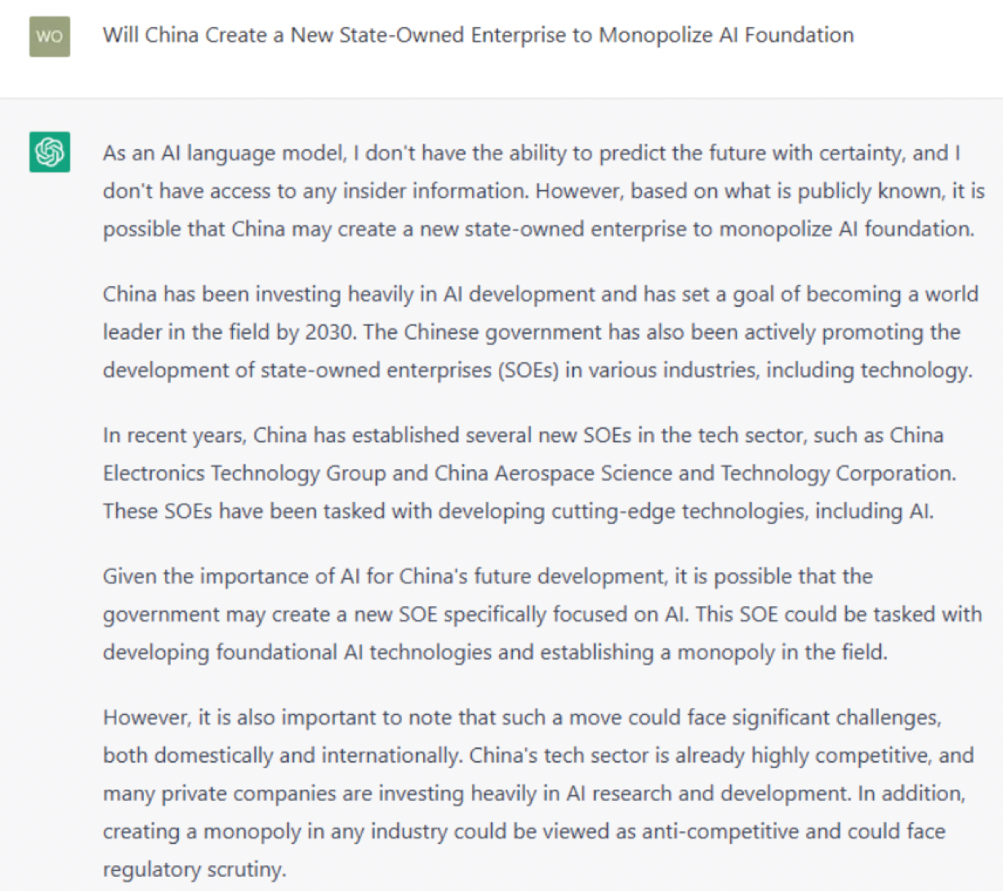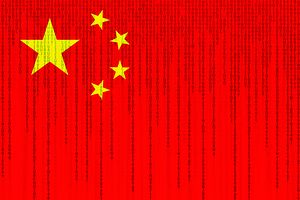With the recent releases of large-language models, such as ChatGPT, artificial intelligence (AI) capability has leapfrogged, attracting intense attention around the globe. Inspired by the success of ChatGPT, many Chinese technology companies, such as Baidu, rushed to announce their own plans for developing a Chinese version of ChatGPT. However, to everyone’s surprise, the Chinese government recently banned tech companies from offering ChatGPT-like services and will potentially impose more regulations on the development of AI.
Since AI has gradually evolved into a foundational part of societal infrastructure essential to national interests, China may create a new state-owned enterprise (SOE) to monopolize AI foundation in China, similar to how SOEs monopolize the energy and telecommunication sectors.
Traditionally, China’s SOEs have controlled industries that are deemed essential to national interest and China’s economy. It has been estimated that the share of SOEs in China’s GDP is at least 23 percent. Particularly, as China is transitioning from an investment-driven export economy to an innovation-driven economy reliant on domestic consumption, the role of SOEs has become increasingly more important, as these state-owned firms are driving China’s economic transition. Furthermore, one study indicated that Chinese SOEs form an integrated system to not only economically benefit the state but also to guarantee that the whole country stays within the state’s control.
Returning to AI, the field is estimated to completely revolutionize the world’s economy with an estimated $15.7 trillion contribution to the global economy by 2030. Along the way, AI will become pervasive in people’s daily lives. Hence, AI will not only impose a significant economic impact but also become essential to the state’s control, satisfying both key factors for the creation of an SOE.
AI has gradually become an essential part of societal infrastructure in recent years. For instance, the Estonian government launched a new AI-based virtual assistant to provide Estonians with a voice-based way to navigate key services provided by the state, such as renewing a passport or applying for benefits. In Finland, a similar AI platform can offer medical services to help citizens renew prescriptions and notify them of potential health risks. With AI being able to access, aggregate, and analyze sensitive personal information of the whole Chinese population, I have a hard time believing that the Chinese government will leave this capability to companies in the private sector.
Besides the fact that AI is essential to the national interest, large AI models such as ChatGPT are also extremely expensive to develop and maintain. It has been estimated that each training of a large language model could cost millions of U.S. dollars. Racing to become the leading suppliers of AI technologies in China, venture capitalists and technology companies could easily pour tens of billions of dollars into developing large language models that are very similar to each other, leading to overprovisioning of similar AI technologies.
In the view of the Chinese national government, overprovisioning, which has happened in the intelligent electric vehicle industry, is not an efficient utilization of China’s financial resources, and thus should not be encouraged. Instead, China may centralize financial and computing resources to one or a selected few institutions to develop AI foundation models.
Going forward, the AI ecosystem will be divided into development of foundation models and specialty fine-tuning. For national security and cost efficiency reasons, I foresee that China’s foundation models would be trained by only one or a few SOEs with substantial financial and computing resources, and most applications will be achieved via lightweight fine-tuning of these foundation models toward specialized uses, such as education, healthcare consulting, legal assistance, customer services, and many more.
Hence, technology companies in China should focus on leveraging their vertical expertise and know-how, as well as user data, to fine-tune the foundation models for commercialization in different business verticals, instead of investing an enormous amount of resources in developing foundation models.
The creation of a new AI-focused SOE may incentive the rapid growth and development of the Chinese semiconductor industry, particularly Chinese Graphic Processing Units (GPUs). GPUs are essential in large-language model training, but the United States has imposed a ban on exports to China of Nvidia and AMD’s flagship artificial intelligence chips. If AI foundation models were to be developed by one or more Chinese SOEs, I foresee further tightening up of export control of AI processors, and SOEs would have no other alternatives but to rely solely on domestic semiconductor suppliers. This could bring short-term pains but long-term benefits to the whole Chinese AI ecosystem.
Lastly, just to illustrate the intelligence delivered by models like ChatGPT, I asked ChatGPT the same question addressed in this piece. Below is the insightful and thorough analysis it provided. Reading this answer, I become even more convinced that China will create a new SOE to provide basic AI capabilities fueling the development of various sectors in China.


































